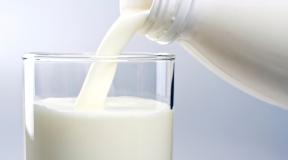The harm of coffee. Statement based on facts
Disputes about the dangers and benefits of coffee have been going on for more than one century. As soon as this drink began to conquer Europe, it began to grow overgrown with many myths, the results of supposedly conducted research, and so on. Even today, accurate confirmations are useful and negative impacts there is very little of this drink for the body, so it remains to take into account hypotheses and listen to your own body.
general information
Research on the effect of coffee on the body has indeed been carried out and is being carried out by many well-known laboratories and institutes. But even today, in the presence of excellent equipment, reagents and special knowledge, scientists have not been able to accurately determine the composition of coffee beans and the effect of its components on human health and well-being.
The mystery lies not only in the complex composition and properties of grain, but also in the individual reaction of a person to this product. The effect of coffee on the human body can be manifested by an invigorating effect, an increased heart rate, an increase in blood pressure, or an elementary mood boost due to the production of the hormone of happiness. So far, no scientist will be able to accurately answer the question of what exactly will happen inside the body of two people of the same sex and age after drinking a cup of coffee.
About coffee with humor
In medical practice, there are cases when a person, after taking a cup of drink, had a hypertensive crisis without visible prerequisites. In another category of people, the product caused relaxation and tranquility and acted on the nervous system more effectively than a sedative drug. The third category experienced a strong diuretic effect.
It must be admitted that most people start their morning with a cup of coffee for pleasure. The aroma of the drink gives them pleasant emotions, and the taste sets them up for positive. Perhaps the body's individual reaction to certain drinks is genetically programmed or acquired in early childhood.
How coffee works on internal organs and systems
How coffee affects the human body should be discussed from the perspective of a drink made from natural grains. The role of the soluble is not taken into account here, since there are too few of any useful or unhealthy substances in its composition. In most cases, information is based on observations, assumptions and hypotheses of researchers.
The cardiovascular system
The caffeine contained in the drink stimulates the contraction of the heart muscle, which can lead to heart palpitations and even arrhythmias. Usually this reaction to an alkaloid is short-lived. For hypertensive patients, coffee has a negative effect, since it can raise blood pressure by several units. For hypotensive patients, this is undoubtedly a useful drink, as it brings blood pressure back to normal and relieves headache attacks caused by a decrease in the tone of the vascular walls. In some cases, caffeine has an analgesic effect and may be indicated for migraines.
Musculoskeletal system
According to some reports, coffee provokes an increased excretion of calcium from bone tissue. This is not the cause of serious illnesses, but one of the factors that provoke them. Therefore, people who are genetically predisposed to arthrosis, osteoporosis and other diseases of the bones and joints should consume coffee with long breaks and no more than 3 cups a day. It is better to supplement the drink with milk and consume more foods rich in calcium.
Liver and kidney
In case of serious diseases of the liver and kidneys, coffee should be consumed rarely and in small portions. But according to research by scientists, coffee helps to remove sand from the kidneys, and therefore prevents the formation of stones. As for the liver, regular consumption of the drink prevents fibrotic tissue changes, which will protect against degeneration of cells and neoplasms.

Coffee cannot be combined with a cigarette
Digestive system
Caffeine tones the stomach and increases appetite. From this there is an increased secretion of gastric juice, which further improves digestion. Overall, coffee speeds up metabolism by 15%. This is taken into account by people seeking to lose weight. In addition, there is information that the components of the drink help to release fatty acids from fat cells. But this fact will be relevant only in case of additional physical activity.
Research conducted at the Minnesota Institute has shown that regular intake of this invigorating drink can help prevent the development of type 2 diabetes. Moreover, in this case, the main role is played not by caffeine, but by a complex of organic acids, vitamins and minerals. If you drink it, the preventive effect increases by 10-15%.
Brain and nervous system
Coffee affects the brain and nervous system in the most positive way. And this is not only related to the acceleration of mental activity.
Caffeine in combination with other components helps to improve memory and prevents the development of atherosclerosis:
- The ability to learn is increased by accelerating the transmission of nerve impulses.
- There is an activation of attention, concentration.
- Information processing processes are accelerated.
These discoveries were made at the University of Birmingham. The effect of coffee on the body is defined as stimulating. And the excitement is not only felt nervous system and the stomach, but other organs and systems by improving their blood supply. Research is currently underway on the ability of coffee to remove radiation, affect sexual activity, relieve depression, etc.
Coffee for the female and male body
The effect of coffee on a woman's body is somewhat different from the effect on men. A woman is always more emotional and prone to developing depression. Here coffee, with its invigorating and stimulating effect, will help relieve attacks of bad mood, bring back to life and cope with headaches. There is evidence that the drink is useful for those women who suffer from severe manifestations of PMS. It relieves headaches, back pain, and relaxes the pelvic muscles. Scientists put forward hypotheses about the ability of coffee to prevent the development of cancer of the female reproductive system.

100 ml of coffee a day is a safe dose for pregnant women
Pregnant women are better off avoiding or minimizing the amount of drink consumed. Caffeine crosses the placenta well, which means it can affect the condition of the fetus. Doctors also talk about an increased risk of developing allergies in a child whose mother drinks a lot of coffee. According to other sources, regular consumption of the drink increases the risk of miscarriage by 12%.
Men are not immune from the influence of coffee either. With prolonged use of more than 3 cups of the drink a day, sexual function deteriorates. This is due to the presence of herbal female hormones in it. However, the positive effect of coffee on the cardiovascular system of men is the prevention of strokes and heart attacks, and this is the main cause of death among the strong half of humanity.
The effect of coffee on the human body is still a controversial issue. Whether it adds health or takes away, depends on individual characteristics, so it is important to listen to yourself and make your own decision about the refusal or the amount of use.
An invigorating morning drink is an integral part of the life of a modern person. Without it, many cannot gather, concentrate, or even wake up. But is coffee really that safe? Many myths have been created about the use of this drink: they say that it can cause a heart attack and stroke, cause cancer, and affect the appearance of excess weight. What is the scientific basis for these statements? What is the harm from coffee can our body get? Let's try to figure it out.
A cup of coffee in the morning: cheerfulness that gives way to decline
How did a person come up with the idea to start drinking coffee? Legend has it that one shepherd noticed that when his goats chew berries and leaves from one bush, then they cheerfully run around the meadow and cannot sleep at night, although there seemed to be no reason for this. This is how the tonic properties of coffee were discovered. But initially, not a drink was prepared from it, but food: ground grains were fried with cheese or cottage cheese, and then rolled into balls and ate.
Its tonic properties are associated with its high caffeine content. Caffeine is a psychostimulant. It has a stimulating effect on the nervous system, but only for a while. Half an hour of cheerfulness can be replaced by lethargy, apathy and irritability.
And if you practice "coffee ceremonies" in the morning too often, you can end up with chronic fatigue syndrome and even depression. With the regular and uncontrolled use of this drink, a person can fall into a state akin to addiction. The lack of a morning "dose" can bring real discomfort to a person. And since the body gets used to caffeine and stops responding to it, a person, trying to achieve the same effect, drinks the drink more and more often.
The secret is that caffeine doesn't bring in energy from the outside. It forces the body to use up the reserves that it sets aside "for an emergency." After 3-6 hours, vigor and concentration are replaced by apathy and lethargy. If an employee drank a lot of coffee in the office early in the morning, then by lunchtime he becomes completely disabled. Therefore, the extraordinary performance of a person “on caffeine” is nothing more than an illusion.
The harm from drinking coffee is that it reduces overall performance. Yes, it is capable of increasing energy in an unnatural way for a short time. But overall performance will be lower. Therefore, it cannot be consumed uncontrollably and unrestrictedly.
So, the harm of black coffee, proven by scientists, can be the reason for refusing this drink, because:
- a short-term burst of strength from a drunk cup of coffee entails a general decrease in performance,
- under the influence of caffeine, the body gets into a state of stress, in which digestion worsens,
- coffee can cause addiction and withdrawal symptoms (something like "withdrawal").
Moreover, the consequences of drinking coffee can be disorders of the cardiovascular system, cancer and imbalance of fluid in the body.
Coffee causes an uncontrolled contraction of the walls of blood vessels. For a weak cardiovascular system, this can cause serious health problems. A single use of the drink can increase blood pressure by 10 mm Hg. There are ages and conditions in which this figure can have a decisive effect.
International organizations that are engaged in oncology research, attributed caffeine to carcinogens of the third group ... This means that, theoretically, the substance is capable of provoking the development of tumor cells. When roasted, the beans form the chemical compound acrylamide. It is a carcinogen. The stronger the roast, the more acrylamide is produced in the resulting product. Therefore, in the United States, where the population is addicted to coffee much more than in our country, it is this drink that is considered the most destructive source of acrylamide.
The harm of coffee in the processes of maintaining water balance in the body is a scientifically proven fact.
Because it is a fairly strong diuretic, a substance that helps to remove fluid from the body. Of course, in some situations, such drugs are prescribed specifically in order to activate the circulation of fluid in the body. But in the heat of summer or in a hot room, this effect of caffeine becomes harmful. Its diuretic effect is worth considering. After all, such a drink will not replenish the fluid balance. Quenching your thirst with an invigorating drink is just an illusion. Coffee can cause dehydration. And a lack of fluid in the body provokes serious disorders. This phenomenon provokes drying out of the mucous membranes, and as a result, the decline of local immunity. That is, the mucous membranes of the nose, eyes and mouth cease to retain microbes. The most striking manifestation of this is the increase in the incidence of viral infections. The risk of catching a cold, developing conjunctivitis or stomatitis increases significantly. Drying of the mucous membranes can provoke bad breath, dry eyes, and discomfort when swallowing.
The diuretic effect of coffee can be critical for the health of the elderly. But the effect of coffee on the musculoskeletal system is more dangerous. The drink helps to flush calcium from the bones. And in old age, the skeleton is very fragile. For the same reason, the drink is not recommended for children and adolescents during the period of active bone formation. Pregnant women who are actively consuming calcium for laying the baby's skeleton should also refrain from it.
This invigorating drink has an effect on the digestive process.. It provokes the secretion of hydrochloric acid in the stomach. It is designed to digest food. If it is produced uncontrollably and at the wrong time, then a person may have problems with digestion: bloating, flatulence, gastritis, ulcers and heartburn.
Same way coffee can act as a laxative ... More precisely, it speeds up the process of moving food from the stomach to the intestines, even if it is not completely digested. This interferes with the absorption of nutrients.
So, what harm does coffee bring to the human body as a whole? Here are the facts to make you think:
- coffee can raise blood pressure and cause heart problems,
- a person who often includes it in the diet is at risk of high blood cholesterol,
- coffee is included in the list of substances that can have a carcinogenic effect,
- has a diuretic effect, which can cause imbalance in the water balance in the body,
- a lack of fluid can lead to a decline in local immunity, cause frequent colds, and lead to problems with mucous membranes,
- coffee flushes calcium from bones and can cause osteoporosis,
- coffee has a negative effect on digestion processes.
Instant and decaffeinated coffee: harm to health
So, the main active ingredient of this invigorating drink is caffeine. And most of the negative effects are associated with it. Therefore, among coffee lovers who have decided to end their addiction, the decaffeinated type of coffee is so common.
The history of the discovery of this species is also associated with a legend. One of the merchants transported coffee beans on a ship for later sale. During the trip, sea water flooded the cargo. After the wet bags were dried, and the grains were crushed and tried to brew, it turned out that the pleasant taste of the drink was preserved, and its invigorating property came to naught.
Now it is specially decaffeinated. But it should be borne in mind that caffeine does not completely disappear from the drink. It's just that its content becomes much smaller.
Typical example: A person drinks 5 cups a day and is worried that it might harm him. So he switches to a decaffeinated drink. As a result, he now drinks 15 cups a day and is still receiving the same dose of caffeine. Therefore, decaffeinated coffee is not a panacea. He is able to provide all the same negative effects, only in a reduced form.
Another type of drink is instant coffee. The way to get it is as follows. A highly concentrated beverage is brewed from ordinary beans, which is then dried to obtain a powder or granules. These granules are easier to transport, cheaper and able to retain their flavor longer. But the instant variety is usually made from grains of low grade or poor quality. Therefore, the raw materials for it are usually of much lower quality.
In addition, the invigorating effect of instant coffee is much weaker, if not completely lost.
The top layer of the grain contains caffeine, and the inner layer contains theobromine, says Dr. Aleksey Kovalkovsky. - They act in different ways. Caffeine constricts blood vessels in the body and dilates the vessels of the kidneys, that is, it tones and has a diuretic effect. Theobromine works the other way around. Instant coffee always contains more theobromine, because some of the caffeine is sent to the pharmaceutical industry. Truckers often drink instant coffee before a flight, and after 30 km from the city they start having accidents. There is a drowsy effect.
It would seem that if there is no invigorating effect, then the harm of coffee should come to naught? This is not true. Theobromine has almost all of the negative effects of caffeine, except those associated with the tonic effect.
Harm of coffee for women
A separate story is the effect of a tonic drug on the female body. This is especially true during pregnancy. As already mentioned, during this difficult period for the female body, coffee can greatly deplete calcium reserves in the body. But this substance is extremely necessary for the construction of a child's skeleton!
The tonic is able to cross the placenta. So, what other negative effects do doctors observe if the expectant mother abuses caffeine-containing drinks?
- Removal of calcium from the mother's body.
- Increased heart rate in a child.
- Decreased blood circulation in the placenta. The consequence of this may be the development of the risk of anemia. As a result, the child does not receive enough oxygen, which is needed for the formation of all vital systems of the body, and especially the brain. Anemia can trigger preterm labor. And after them, the likelihood of infection with what increases?.
- Slowing down of the physical development of the fetus. The risk of having a baby with underweight.
- Increased risk of having a baby with heart disease.
In addition, it is worth remembering that all the negative effects of coffee on the cardiovascular and urinary systems remain valid. But for a pregnant woman, the slightest increase in pressure or a lack of fluid in the body can have a fatal effect!
Harm of coffee for men
Since ancient times, coffee has been considered the strongest aphrodisiac. It tones up and excites, and this affects its positive effect on male potency. But to abuse such a means of increasing potency is also not worth it.
Harm of coffee for men lies in the fact that it contains plant substances that are similar to female sex hormones - estrogens. Those, in turn, are able to suppress testosterone production.
By the way, in this regard, a natural drink is less harmful than decaffeinated. Herbal hormones from the drink will not be removed during decaffeination, and processed coffee, devoid of its invigorating properties, provokes a man to drink more. Therefore, by getting less caffeine, a man gets much more estrogen-related substances.
With age, men become more susceptible to cardiovascular disease. Therefore, the tonic effect of coffee can affect their body in a fatal way. The fragile walls of blood vessels may not withstand the tonic effect.
How to give up coffee?
People who have decided to overcome their addiction to a tonic drink recognize that coffee is not a cigarette. You can give up this habit gradually. You can start small, but don't forget about the main goal.
- Stop cheering yourself up with a hot drink at least on weekends. Indeed, these days you do not need increased efficiency and active energy. Unhealthy vigor after a cup of coffee can interfere with healthy rest or proper sleep.
- Replace coffee with tea. Tea also contains caffeine, and it can also have an invigorating effect. But here the tonic substance is much less. Gradually you need to switch to mineral water, juices and compotes. After all, tea is also not a panacea. And it contains harmful substances, and it can also have a diuretic effect.
- Have a new awakening ritual for yourself. If you are a coffee lover with experience, then most likely you have noticed that you are used to caffeine, and he is no longer able to provide its invigorating effect on you. You may just wake up from drinking a mug of something hot. Let it be heated compote, broth or just water.
- Get enough sleep. Often the reason for feeling unwell is not a lack of coffee, but a chronic lack of sleep. Get in the habit of going to bed early. And in the morning, try to take time to exercise or jog. It wakes up better than an artificial psychostimulant.
So, there are many myths floating around the "coffee lovers". Most of them turn out to be true. It has an ambiguous effect on the nervous system and can cause abnormalities in the work of the cardiovascular system. Coffee is contraindicated in pregnant women and people of old age. It is capable of causing gastrointestinal upset. Scientists put it among the carcinogenic substances. This drink can cause an imbalance in the water balance in the body, and, as a result, lead to frequent colds, problems with mucous membranes and a general decrease in local immunity. But most importantly, with regular abuse of this drink, it completely loses its invigorating properties. All that a person can get with his uncontrolled consumption - forms of addiction and withdrawal syndrome ("withdrawal"). Therefore, it is better to replace this artificial source of vigor with healthier alternatives: proper sleep, morning exercises or jogging, and healthy drinks such as mineral water.
For more than a thousand years, the controversy surrounding one of the most popular drinks in the world, coffee, has not subsided. And, perhaps, the most interesting topic of such discussions is the question of what exactly is the effect of coffee on health. Each of us has heard both that coffee is harmful and that it is useful, but the absolute truth is not known to doctors even today. More precisely, it is simply impossible to answer this question in one word - the effect of coffee on the body is quite complex, and that is why it cannot be said that coffee is definitely harmful or unambiguously healthy.
How exactly does coffee affect the human body
Nevertheless, scientists continue to conduct all kinds of research, conduct experiments and conduct experiments - more than 19 thousand times they tried to figure out exactly how coffee works on health. During the time that these studies were carried out, doctors were able to find out that coffee can cause cancer, get rid of diabetes, stimulate the work of the heart muscle, change blood pressure, however, how close to the truth these and many other statements will be in each case, it is still not clear. That is why it is better to approach the question of what will be the effect of coffee on the body on an individual basis, separately considering the "history" of each patient ... a lover of an invigorating drink.
Composition of coffee
To begin with, it is worth mentioning that one coffee bean consists of more than 2 thousand different substances, each of which can affect the state of human health. Among these substances are undoubtedly useful vitamins PP, pyridine, magnesium, calcium, iron. At the same time, the main effect of drinking coffee is achieved due to the content of caffeine in it - there is a general stimulating effect on the nervous system and stimulation of the work of the heart muscle (which is sometimes called harmful or useful), and an increase in blood pressure (so desirable for hypotensive patients and actually contraindicated for hypertensive patients).
Coffee is bad or healthy
They say that the easiest way to determine whether coffee will be harmful or beneficial in a particular case is to listen to your own body. If a person wants coffee, he feels the need for it, which means that you should not deny yourself, within reasonable limits, of course. If a person cannot classify coffee as a favorite drink, does not feel like drinking it regularly, then you should not force yourself to drink it, no matter what benefits the calculations of scientists promise.
By the way, about the calculations - in some issues regarding the effect of coffee on the human body, doctors are unanimous... In particular, coffee has been proven to raise low blood pressure and is a good remedy for headaches. If you drink coffee with milk after meals, it will speed up the work of the stomach - food will be digested faster, which is also quite useful. It is believed that coffee contributes to weight loss - if you drink a drink without additives (sugar, milk, etc.), then it will enhance lipolysis, as well as activate the processes that are responsible for the release of energy. In addition, it is known that coffee dilates blood vessels, is able to remove excess water from the body.
Almost all doctors claim that coffee in reasonable amounts reduces the risk of stroke, diabetes, and the appearance of age-related diseases such as Parkinson's disease or senile dementia. Finally, those who are constantly on a diet will be pleased to know that 100 mm of coffee contains only 9 calories. If you remember that a cup of hot coffee can dull hunger, and the drink itself contributes to weight loss, it turns out that together with this drink, weight loss becomes an easier task.
Coffee: contraindications
However, there is also a downside to the coin. If you drink too much coffee (drinking more than four cups a day), then the drink can increase the risk of developing cardiovascular diseases. In addition, doctors warn that caffeine can raise cholesterol levels, which accumulate on the walls of arteries and constrict blood vessels. Drinking coffee during stress, with chronic fatigue, at the same time as smoking - enhance the negative effect of these processes on the body and, in particular, on the central nervous system. If a person suffers from increased excitability or is simply in a nervous state, an extra cup of coffee will only exacerbate the problem.
Finally, doctors do not advise drinking coffee at the same time as some medications - this can not only reduce the therapeutic effect, but also make the results of therapy inversely the opposite of the desired ones.
It is also worth considering that there is a relationship between the degree of influence of coffee and the type of drink. So, the most invigorating and exciting, oddly enough, is not brewed, but instant coffee... At the same time, in all other respects, the harmful effect for instant coffee is stronger, and the beneficial one is weaker. In any case, before becoming an ardent adherent of regular drinking of coffee for health purposes or, on the contrary, completely abandoning the drink, you should take into account your own health condition, and in some cases consult a doctor.
Regular coffee consumption in many causes fears for their health, especially against the background of exposing articles about the dangers of a fragrant drink. It's time to figure out the effect of coffee on the body. We will only take medical or scientific facts into account, and leave emotional or value judgments out of the way. As a result, we hope to get an objective picture of exactly how the infusion of coffee beans affects a person.
Despite the fact that the exact chemical composition of coffee beans is still a mystery, researchers are aware of all the main active substances. They determine how coffee acts on the human body.
The chemical composition of coffee
- Alkaloid caffeine is the most famous component of the beans of the coffee tree. This stimulant acts very quickly. Literally, within a few minutes after consumption, it raises the heart rate, stimulates the central nervous system, and speeds up the metabolism. Under its influence, muscle tone increases, a surge of vivacity and energy is felt. An excess of caffeine leads to a rapid heartbeat, a sensation of heat in the body. Nausea and dizziness are possible.
- Trigonelin- another representative of the alkaloid group. By the way, it is he who gives the coffee an unforgettable aroma. When fried, this substance quickly decomposes under the influence of heat and forms niacin. Don't be intimidated by its name. It plays a very important role in the biochemistry of our body and prevents many diseases, especially those developing against the background of vitamin deficiency.
- Organic acids... There are about 30 types of coffee in the coffee bean. Among them is a very rare chlorogenic one. It is practically not found in other food products. Meanwhile, it helps digestion well and even acts as a natural antiseptic. The result of exposure to organic acids is the activity of the digestive system. They are also involved in the formation of healthy gut and oral microflora. Although dentists complain that coffee stains teeth, it prevents bacteria from settling on the enamel.
- Polysaccharides... When roasted, they turn the beans into a characteristic brown color. Polysaccharides supply the body with complex carbohydrates, which has a positive effect on the activity of the brain.
Influence on a person
There are many other chemicals in coffee, but we are more interested in what we get as a result of the complex action of a cup of drink?
- Central nervous system stimulation
- Enhanced brain function
- Excitement of muscle activity and increase in muscle tone
- Increased production of the hormones dopamine and serotonin, as a result - reduced stress levels and improved mood. Researchers assure that the level of these hormones increases even when the coffee aroma is inhaled, so people consider the smell of coffee pleasant for themselves.
- Increased metabolism and decreased appetite
- Improving digestion
- Normalization of microflora of mucous membranes - oral cavity, intestines
Benefits of coffee
- Coffee acts as an enhancer of the action of antibiotics and pain relievers. But perhaps the most important discovery of recent years is the ability of coffee to reduce the accumulation of proteins in the brain. But it is they who "help" the age-related impairment of memory, concentration, and, as a consequence, the development of Alzheimer's disease. So coffee is an excellent prevention of senile dementia. Enough 200 ml of drink a day to prevent protein accumulation in the brain tissue and help to avoid very unpleasant complications in old age.
- Coffee has worked well in antiallergenic therapy. The drink helps to reduce the level of histamines that cause allergic reactions.
- Doctors are increasingly talking about the prevention of tumors, including malignant ones, with the help of coffee. Scientists are confident that the properties of coffee help it inhibit the growth and development of even cancer cells.
It should be borne in mind that all these pleasant bonuses are received by a conditionally healthy person. For those who suffer from functional disorders of any system of the body - heart, digestive, nervous - it is wiser to refuse coffee. Its stimulating effect can provoke a sharp reaction of the body.
Safe dose of coffee
From a safety point of view, 3-4 cups of coffee a day are considered the optimal dose. Six or more cups is considered overuse, which can lead to an overdose of caffeine in the body. In this case, coffee stops acting as a stimulant and begins to work as a destroyer.
The effect of coffee on a woman's body
Does the effect of the drink differ depending on who drinks it? Let's take a closer look at the effect of coffee on a woman's body.
- The weaker sex has a more sensitive and vulnerable nervous system, so the effect of natural stimulants on women is usually much stronger. In other words, it is better for women to stick to the lower limit of coffee consumption. 3 cups are enough to experience the positive effects of the drink.
- It is 3 cups of drink a day that reduces the likelihood of developing ovarian cancer by 20%.
- Women's migraine responds well to coffee therapy, especially if it is caused by meteosensitivity or pressure drops. Of course, not always a cup of coffee will save you from a headache, so do not neglect visits to the doctor if migraines are of a regular nature.
- Doctors question the drinking of coffee by pregnant women. At a minimum, the drink stimulates the production of adrenaline and increases muscle tone, and this may be unsafe for bearing a baby. Therefore, it is better to refuse to drink coffee during pregnancy.
The effect of coffee on the body of a man
What do doctors say about the specific effect of coffee on a man's body? Most of the controversy arises about the effect of the drink on the potency of the stronger sex.
- North American doctors assure that an excess of coffee reduces a man's sex drive, since over time, a man's body accumulates estrogen - a female hormone. Its excess reduces potency.
- Brazilian scientists give completely different data. In their opinion, a cup of coffee after breakfast, on the contrary, activates attraction. In addition, the stimulating effect of coffee increases sperm motility and the likelihood of conception increases.
It is worth noting that when the data were published, nothing was said about who the research was carried out on. Meanwhile, experiments on groups of women show that different races react differently to coffee. If in young women of the Caucasian type, the amount of estrogen decreased from a cup of coffee, then in Asian and African groups this indicator increased. Perhaps the same is true for men.
The harm of coffee
The question of the dangers of coffee remains open. How does a fragrant drink interfere with our body? A negative effect may well occur with a one-time overdose. Symptoms will be:
- Increased heart rate
- Dizziness
- Weakness
- Nausea
With a serious excess of caffeine, a person may lose consciousness or experience attacks of loss of orientation in space, a sharp decrease in vision clarity. All this is associated with an excess of adrenaline and severe pressure on the vascular system.
It is believed that a coffee overdose can occur with a single intake of about 600 mg of caffeine, which is equivalent to 5-6 cups of strong espresso, drunk one after another.
Regular abuse of coffee can cause neurosis, stress, and insomnia. The most dangerous thing is that uncontrolled intake of caffeine exacerbates chronic human diseases. Problems with the heart, blood vessels and the digestive system can be especially acute.
It has been proven that the drink itself does not cause or provoke the development of diseases. Excessive use of it can exacerbate chronic problems, just like any violation of the recommended regimen for such people.
Who should be especially careful when consuming this invigorating infusion?
- People with chronic diseases of the heart, pancreas and vascular system.
- Pregnant and lactating women, to avoid the indirect effects of caffeine on the brain of the fetus or young child.
- Persons under chronic stress, experiencing regular psychological overload. In this case, coffee unnecessarily excites the already overloaded nervous system.
Conclusion
The effect of coffee on the body is due to the individual condition of a person, and, possibly, his genetic predisposition. Modern studies force us to conclude that 3-4 cups of natural coffee a day have, rather, a positive effect, gently stimulating and activating the functions of all major body systems
And what effect of coffee on the body do you notice for yourself? More positive or negative?
Since ancient times, coffee has enjoyed wide popularity, and in modern society there are more than enough coffee lovers. At the same time, there is a constant debate about the benefits and dangers of this drink. To get an objective picture, you need to know what is the effect of coffee on the human body.
The chemical composition of coffee beans is very complex. Active substances and their amount depends on the growing conditions, soil, variety.
Roasted coffee contains over 1000 different chemical compounds. Of these, 800 are directly responsible for the taste of the drink.
Chemical composition:

How much coffee works depends on the individual characteristics of the person. The average period of action is 4-6 hours. The effect begins to manifest itself after a while and is felt in different ways. Someone feels a rush of activity for an hour, while for someone a cup of the drink lasts for a long time.
Effects on the nervous system
 To a greater extent, coffee, due to its chemical composition, acts on the nervous system. Under the influence of caffeine, the vessels of the brain expand. This speeds up blood circulation in the nervous central system. As a result, biochemical processes are faster.
To a greater extent, coffee, due to its chemical composition, acts on the nervous system. Under the influence of caffeine, the vessels of the brain expand. This speeds up blood circulation in the nervous central system. As a result, biochemical processes are faster.
An invigorating drink accelerates the transmission of nerve impulses from neuron to neuron. At the same time, nervous excitability increases, energy is felt, a feeling of cheerfulness comes, the work of the sensory organs intensifies, and fatigue decreases.
This explains the desire to have a cup of coffee in the morning to wake up completely. Drinking 4 cups of this drink daily significantly reduces your risk of developing Parkinson's disease.
But do not forget about the side effects of coffee on the nervous system. Too much stimulation can lead to exhaustion. This pattern was investigated at the beginning of the 20th century by I.P. Pavlov. Exceeding the recommended dose of coffee can lead to the following consequences:
- prostration;
- lethargy;
- lethargy;
- drowsiness;
- depressive state.
Effects on the digestive and genitourinary system
 Coffee has a diuretic effect, and it is pronounced, so it is important to monitor the amount of fluid you consume. This property of the drink can be used during ailments and colds. However, it should be borne in mind that active urination leads to a loss of calcium.
Coffee has a diuretic effect, and it is pronounced, so it is important to monitor the amount of fluid you consume. This property of the drink can be used during ailments and colds. However, it should be borne in mind that active urination leads to a loss of calcium.
The coffee drink increases the production of gastric juice by irritating the stomach lining. The effect on the digestive tract is not associated with caffeine, but with organic acids that are found in coffee, namely:
- apple;
- acetic;
- lemon;
- chlorogenic;
- oxalic.
 These chemical complex compounds affect an increase in the secretion of gastric juice, which speeds up the digestion process. This effect can be considered positive with moderate consumption of the drink, if there are no gastrointestinal pathologies.
These chemical complex compounds affect an increase in the secretion of gastric juice, which speeds up the digestion process. This effect can be considered positive with moderate consumption of the drink, if there are no gastrointestinal pathologies.
If a person has a disease accompanied by an excess of hydrochloric acid in the stomach, the number of cups of coffee drunk per day should be reduced to a minimum or completely abandoned.
Caffeine is known to stimulate many metabolic processes and speed up metabolic reactions. Therefore, it is included in many drugs for weight loss.
Thanks to its biologically active substances, coffee improves the antioxidant defense, reducing the risk of diabetes.
The carcinogenicity of this drink is questionable. There are no precise data confirming or rejecting the effect on tumor development. Some scientists agree that coffee does not increase the risk of developing cancer, but reduces it. This issue is currently being actively investigated.
Impact on women and men
Exploring, how does the property of coffee affect a woman's body, scientists came to the following results:

But for men, coffee is useful, as, being an aphrodisiac, it stimulates the sex glands and enhances potency. But this is only true for healthy men..
The harmful effect is that this drink can provoke the progression of prostatitis. Excessive consumption of it can lead to an increase in estrogen levels.
Overdose and contraindications for use
Excessive consumption of coffee is quite dangerous and fraught with unwanted reactions. This is especially true for a natural drink containing a large dose of caffeine. In case of an overdose, the following symptoms may appear:

The listed reactions observed in coffee lovers accustomed to drinking large quantities of the drink. Acute caffeine poisoning can lead to such consequences as:
- rapid intermittent breathing;
- nausea and vomiting;
- arrhythmia and tachycardia;
- convulsions and delirium;
- redness of the skin.
Given the effects of coffee on the human body, you should be careful about its use. This is especially true for people having the following deviations:

The effect of caffeine on the human body is determined by its individual condition and genetic predisposition. Drinking 3-4 cups of coffee a day has a positive effect. At the same time, overuse of caffeine can cause negative reactions.



















